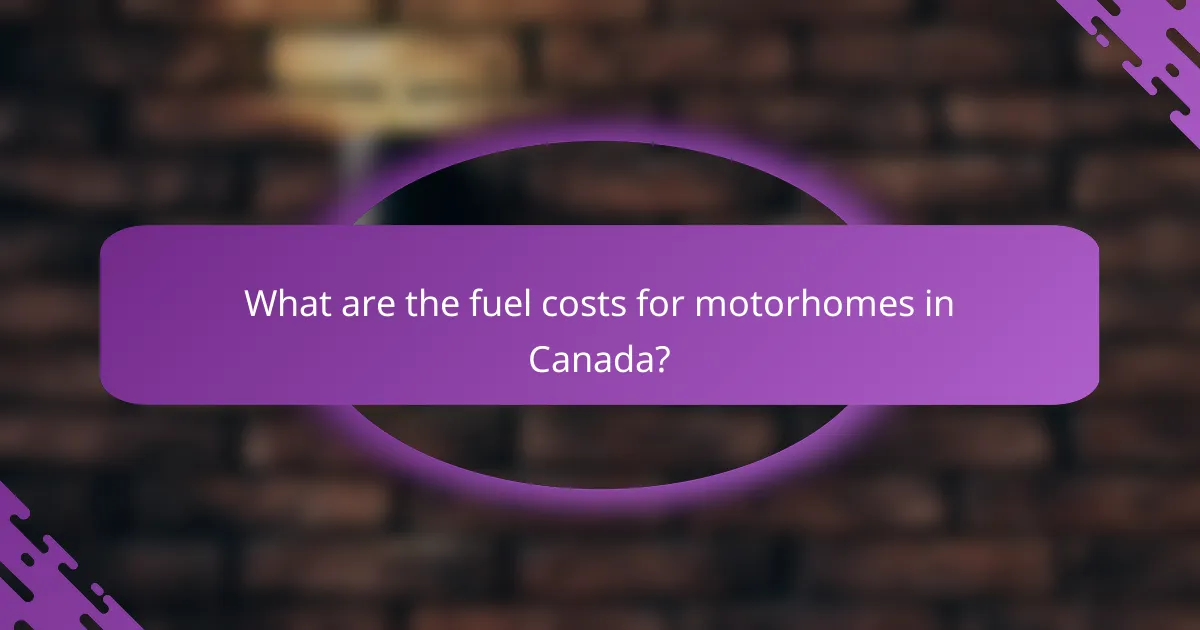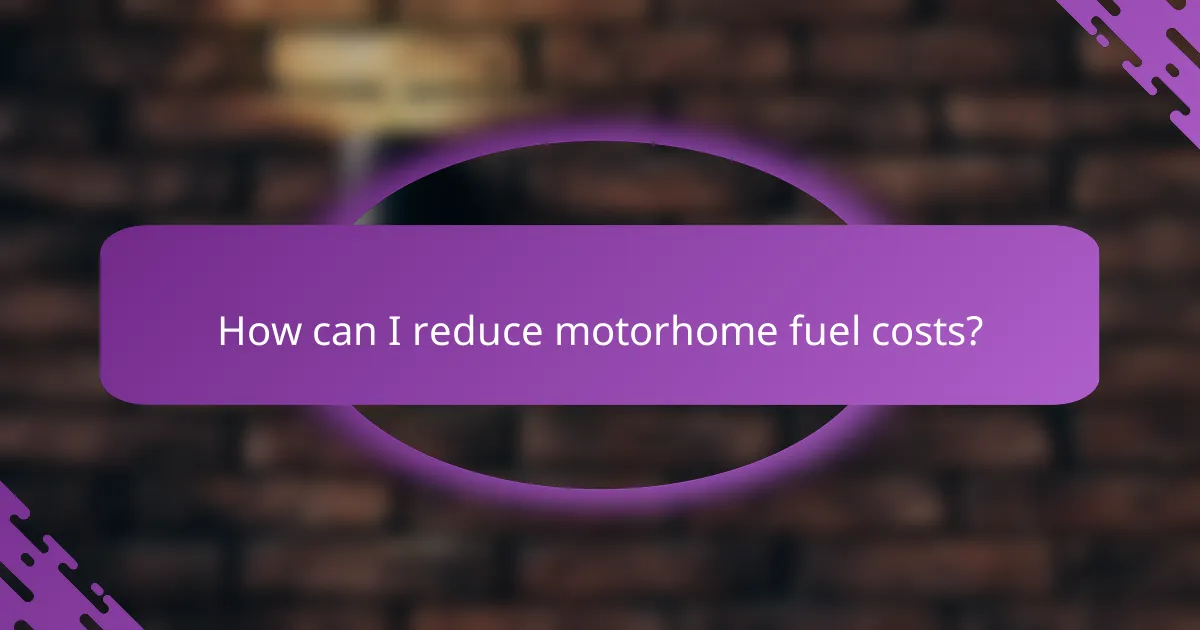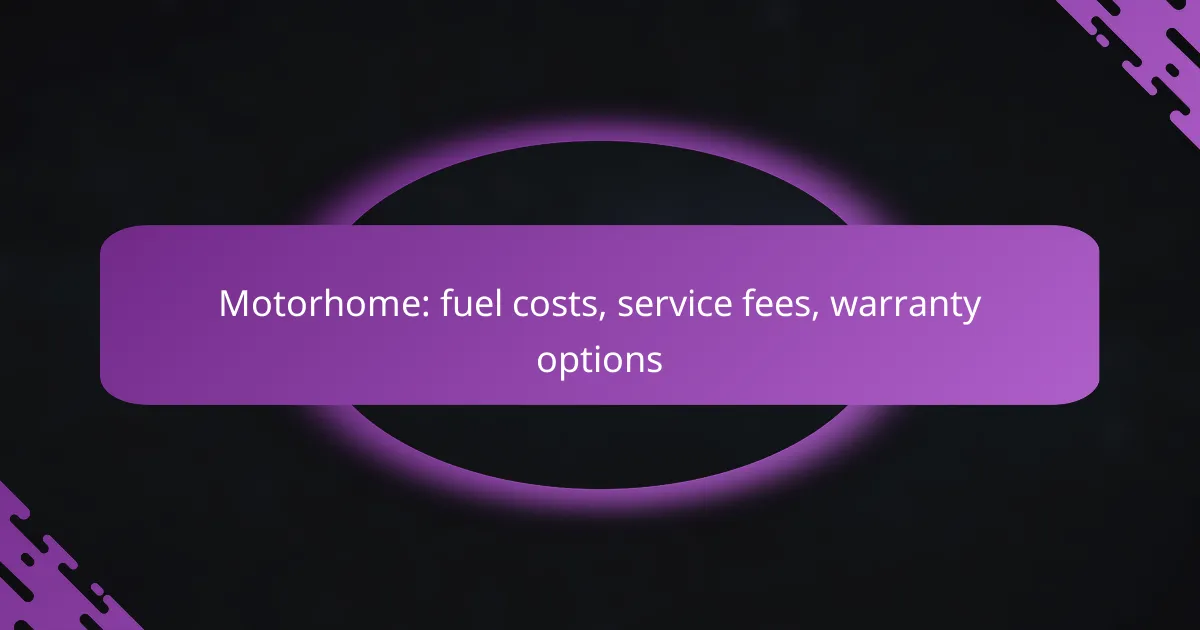Owning a motorhome involves several financial considerations, including fuel costs, service fees, and warranty options. Fuel expenses can vary widely based on consumption and travel habits, often requiring a substantial annual budget. Additionally, service fees for maintenance and repairs are essential for keeping your vehicle in top shape, while various warranty options can provide peace of mind by covering different aspects of your motorhome. Understanding these factors is crucial for effective budgeting and ensuring a smooth travel experience.

What are the fuel costs for motorhomes in Canada?
Fuel costs for motorhomes in Canada can vary significantly based on consumption rates, fuel prices, and driving habits. Typically, motorhome owners should budget for fuel expenses that can range from hundreds to thousands of Canadian dollars annually, depending on usage and distance traveled.
Average fuel consumption rates
The average fuel consumption rate for motorhomes in Canada generally falls between 10 to 15 liters per 100 kilometers. Smaller motorhomes tend to be more fuel-efficient, while larger models, especially those with more powerful engines, may consume more fuel. Understanding your motorhome’s specific consumption rate is crucial for accurate budgeting.
For example, a motorhome that travels 20,000 kilometers annually at a consumption rate of 12 liters per 100 kilometers will use approximately 2,400 liters of fuel each year.
Current fuel prices in Canada
As of late 2023, fuel prices in Canada fluctuate based on region and market conditions, typically ranging from CAD 1.30 to CAD 2.00 per liter. Urban areas may experience higher prices compared to rural regions. Keeping an eye on local fuel prices can help you plan your trips more economically.
Using the previous example, if fuel costs CAD 1.50 per liter, the annual fuel expense would be around CAD 3,600 for 2,400 liters.
Factors affecting fuel costs
To minimize fuel costs, consider maintaining a steady speed, reducing unnecessary weight, and planning routes that avoid heavy traffic and steep inclines. Regular maintenance, such as ensuring proper tire pressure and engine tuning, can also enhance fuel efficiency.

What are the service fees associated with motorhomes?
Service fees for motorhomes encompass various costs related to maintenance, repairs, and seasonal preparations. Understanding these fees can help you budget effectively and ensure your vehicle remains in optimal condition.
Routine maintenance costs
Routine maintenance costs typically include oil changes, tire rotations, and inspections, which can range from a few hundred to over a thousand dollars annually, depending on the motorhome’s size and usage. Regular checks on fluid levels, brakes, and electrical systems are essential to prevent larger issues down the line.
Consider creating a maintenance schedule to keep track of these services. Many motorhome owners find that sticking to a routine can save them significant money by avoiding more serious repairs later.
Repair service fees
Repair service fees can vary widely based on the type of repair needed and the labor rates in your area. Common repairs, such as fixing a water leak or electrical issue, can cost anywhere from a couple of hundred to several thousand dollars. It’s advisable to get multiple quotes from service providers to ensure you receive a fair price.
Be aware that some repairs may require specialized knowledge, which can increase costs. Always check if the service provider has experience working with your specific motorhome model to avoid unnecessary expenses.
Seasonal service considerations
Seasonal service considerations often include winterizing your motorhome or preparing it for summer trips. Winterization typically costs between $100 and $300 and involves draining water systems and adding antifreeze to prevent damage during cold months.
In contrast, pre-trip inspections in spring can help ensure everything is functioning properly, which may cost an additional few hundred dollars. Planning these services ahead of time can help you avoid last-minute rush fees and ensure your motorhome is ready for the road.

What warranty options are available for motorhomes?
Motorhomes typically come with various warranty options that provide coverage for different aspects of the vehicle. These warranties can include manufacturer warranties, extended plans, and options from third-party providers, each offering distinct benefits and coverage levels.
Manufacturer warranties
Manufacturer warranties are standard with new motorhomes and usually cover defects in materials and workmanship for a specific period, often ranging from one to three years. These warranties typically include coverage for the vehicle’s chassis, engine, and essential systems.
It’s crucial to understand the terms of the manufacturer warranty, as it may have limitations on mileage or specific components. For example, some warranties might cover only the first 36,000 miles, while others may offer longer coverage for the structure of the motorhome.
Extended warranty plans
Extended warranty plans are available for motorhome owners who want additional coverage beyond the manufacturer warranty. These plans can be purchased before the original warranty expires and often cover a broader range of components, including appliances and systems not included in the standard warranty.
When considering an extended warranty, evaluate the coverage details and costs, as they can vary significantly. Prices might range from a few hundred to several thousand dollars, depending on the level of coverage and the age of the motorhome.
Third-party warranty providers
Third-party warranty providers offer alternative coverage options for motorhomes, often with flexible terms and pricing. These providers can offer plans that cover specific components or comprehensive coverage for the entire vehicle.
Before selecting a third-party warranty, research the provider’s reputation and customer reviews. Compare the coverage limits, exclusions, and service processes to ensure you choose a plan that meets your needs. It’s advisable to read the fine print to avoid unexpected costs or limitations in coverage.

How can I reduce motorhome fuel costs?
To reduce motorhome fuel costs, focus on efficient driving habits, select the right fuel type, and maintain your vehicle properly. Implementing these strategies can lead to significant savings over time.
Fuel-efficient driving tips
Adopting fuel-efficient driving techniques can greatly enhance your motorhome’s mileage. Maintain a steady speed, ideally between 55-65 mph, as higher speeds can increase fuel consumption significantly. Use cruise control on highways to help maintain this speed without constant acceleration.
Avoid rapid acceleration and hard braking, as these actions can waste fuel. Instead, anticipate traffic flow and gradually adjust your speed. Additionally, reduce idling time; turn off the engine when parked for extended periods to save fuel.
Best fuel types for motorhomes
Selecting the right fuel type is crucial for optimizing your motorhome’s performance and fuel efficiency. Most motorhomes run on diesel or gasoline, with diesel engines typically offering better fuel economy and torque for larger vehicles. If your motorhome is diesel-powered, using high-quality diesel fuel can enhance performance and efficiency.
For gasoline engines, consider using fuel with a higher octane rating if your engine requires it, as this can improve combustion efficiency. Always check your owner’s manual for the manufacturer’s recommendations on fuel types to ensure optimal performance and avoid potential engine issues.

What should I consider when choosing a service provider?
When selecting a service provider for your motorhome, prioritize their reliability, pricing structure, and warranty options. Understanding these factors will help ensure you receive quality service and value for your investment.
Reputation and reviews
Check the reputation of potential service providers by reading customer reviews and testimonials. Look for feedback on their reliability, quality of work, and customer service. Websites like Google Reviews and specialized forums can provide insights into the experiences of other motorhome owners.
Consider asking fellow motorhome enthusiasts for recommendations. Personal experiences can often highlight trustworthy providers and help you avoid those with a history of poor service.
Service pricing transparency
Ensure that the service provider offers clear and upfront pricing for their services. This includes detailing any potential additional fees for parts or labor. A transparent pricing structure helps you avoid unexpected costs and budget effectively for maintenance.
Request a written estimate before any work begins. This document should outline the scope of services and associated costs, allowing you to compare different providers and make an informed decision.

What are the common warranty exclusions?
Common warranty exclusions for motorhomes typically include damage from misuse, lack of maintenance, and certain environmental factors. Understanding these exclusions is crucial for motorhome owners to avoid unexpected repair costs.
Misuse and Neglect
Warranties often exclude damages resulting from misuse or neglect. This can include driving the motorhome off-road, overloading it beyond weight limits, or failing to perform regular maintenance. Owners should keep detailed records of maintenance to ensure compliance with warranty requirements.
Environmental Damage
Damage caused by environmental factors such as floods, hail, or extreme weather conditions is usually not covered under warranty. It’s essential to store the motorhome in a protected area and consider additional insurance for natural disasters to mitigate potential losses.
Modification and Aftermarket Parts
Installing aftermarket parts or making modifications can void the warranty. Manufacturers often specify that only approved parts should be used. If modifications are necessary, consult the warranty terms and consider discussing with the dealer to avoid issues.
Wear and Tear
Normal wear and tear, such as tire wear or interior upholstery degradation, is generally excluded from warranty coverage. Owners should anticipate these costs and budget for regular replacements and repairs as part of motorhome ownership.
